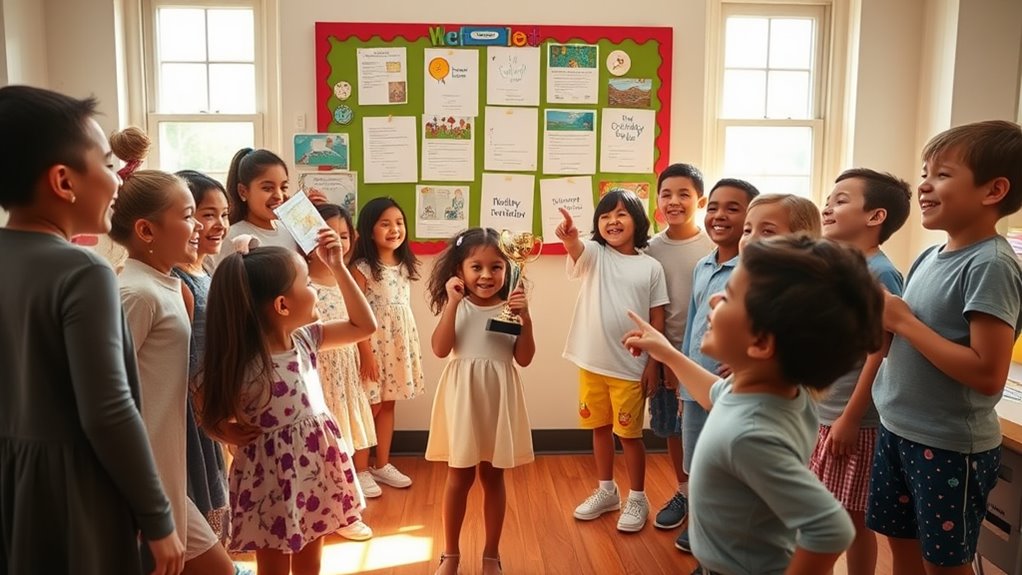Teaching Kids to Recognize and Celebrate Their Achievements
When you think about your child’s development, have you considered how essential it is for them to recognize and celebrate their achievements? By guiding them to reflect on both their big wins and small milestones, you can help build their confidence. Establishing rituals, like a family dinner or a success wall, could transform how they view their efforts. But what specific strategies can you implement to guarantee these celebrations truly resonate? Understanding the nuances might just release a more profound impact on their growth and perspective.
Understanding the Importance of Achievement
Celebrating achievements, big or small, plays an essential role in a child’s development. When you recognize those moments of success, you help build their confidence and self-esteem. Think about it—every time your child accomplishes something, it’s like adding a shiny sticker to their achievement chart! These little celebrations remind them that hard work pays off and that they’re capable of great things.
Understanding the importance of achievement isn’t just about the big wins like winning a trophy or getting an A. It’s also about those everyday victories, like learning to ride a bike or finishing a challenging puzzle. Each time you cheer them on, you’re reinforcing the idea that effort matters.
And let’s face it, who doesn’t love a good high-five after a job well done?
Moreover, acknowledging achievements teaches kids to appreciate their journey. They learn to celebrate not just the end results but also the effort it took to get there.
Setting Realistic Goals Together
Recognizing achievements sets the stage for setting realistic goals together. When you celebrate what your child has done well, it boosts their confidence and helps them see what’s possible.
Now, it’s time to channel that energy into setting goals. Start by asking your child what they want to achieve. Maybe they want to improve their grades, learn a new skill, or even try out for a sports team. Whatever it is, listen closely!
Next, break those big dreams into smaller, manageable steps. If your child wants to ace a math test, create a study plan that includes daily practice and mini-rewards for completing each section. This way, they won’t feel overwhelmed.
Make certain the goals are realistic, too. If they’re aiming for straight A’s, check in on their current grades and workload. Adjust expectations to guarantee they feel challenged but not defeated.
Lastly, celebrate every little milestone along the way. This keeps motivation high and shows them that progress is just as important as the end goal.
With each step, they’ll learn that setting and achieving goals is a fun journey worth taking!
Creating a Celebration Ritual
After reaching a goal, establishing a celebration ritual can make that achievement even more special. It’s like adding sprinkles on top of a cupcake! You can create a fun and memorable way to celebrate every time your child accomplishes something.
Start by discussing what they enjoy. Maybe they love pizza night or a dance party in the living room.
Once you’ve settled on a few ideas, make it a regular thing. For example, after finishing a big project or mastering a new skill, have a special dinner or a movie night—complete with popcorn, of course!
You could even create a “celebration jar” where you write down each achievement on a colorful piece of paper. When the jar fills up, it’s time for a celebration party!
Don’t forget to snap pictures during your celebrations, too. These memories will remind your child how awesome they are! Plus, it’ll give you both a chance to laugh and enjoy the moment together.
The key is to keep it light and fun, so they look forward to recognizing their achievements. Celebrate those little victories, and watch your child’s confidence soar!
Encouraging Self-Reflection Practices
Creating a celebration ritual sets a wonderful tone for reflecting on achievements. Once you’ve celebrated, it’s time to immerse yourself in self-reflection. This is where the magic happens!
Take a moment to think about what you’ve accomplished and how you got there. Grab a journal, or even just a piece of paper, and write down your thoughts. What did you do that made you feel proud? Did you face any challenges?
Self-reflection helps you understand your journey, and it can be a lot of fun, too! You might even discover things about yourself you didn’t know. Maybe you learned how to work well with others, or maybe you found a hidden talent!
Encourage your kids to ask themselves questions like, “What was my favorite part of this achievement?” or “What would I do differently next time?”
These questions spark thoughtful insights and help kids recognize their growth. Plus, it’s a great way to build their confidence!
Using Positive Reinforcement Techniques
Kids often respond well to positive reinforcement techniques, which can considerably boost their motivation and self-esteem. When you notice your child doing something great, whether it’s finishing their homework or helping a sibling, give them a high-five or a heartfelt “Great job!” It can make a world of difference!
You can also use rewards, but keep it simple. Maybe a sticker chart for younger kids or an extra 30 minutes of screen time for older ones. Just remember, the key is to celebrate their efforts, not just the results. When they see that hard work pays off, they’ll be more likely to try again next time.
Another fun way to reinforce positive behavior is through verbal praise. Be specific! Instead of just saying “Good job,” try “I really liked how you worked hard on that project!” This shows them that you’re paying attention and that their efforts matter.
Lastly, don’t underestimate the power of a smile or a thumbs-up. Sometimes, a little encouragement goes a long way. Positive reinforcement isn’t just about rewards; it’s about creating an environment where kids feel valued and motivated to keep achieving!
Sharing Success Stories
Sharing success stories can be a powerful way to inspire and motivate children. When you share stories about people who’ve achieved their goals, it helps kids see that success is possible for them too.
Think about it—when you tell your child about how a famous athlete practiced for hours to win a big game, it shows them that hard work pays off.
You can also include stories from your life or their friends’ lives. Maybe a friend struggled with math but finally got a good grade after studying hard. Sharing these stories can create a sense of connection and encourage kids to keep trying, even when things get tough.
Don’t forget to celebrate the little victories, too! Did they finish a book, or learn a new skill?
Every success counts, no matter how small. When you highlight these achievements, you’re teaching them to appreciate their efforts and recognize their growth.
Making Achievements Visible
Making achievements visible can greatly boost a child’s confidence and motivation. When kids see their successes, no matter how small, it helps them realize they’re capable of great things. One fun way to do this is by creating a “Success Wall.” You can hang up drawings, certificates, or even photos of them at the finish line of a race. This colorful display is a daily reminder of their hard work and accomplishments.
Another idea is to have a “Celebration Jar.” Every time your child achieves something, like finishing a tough book or mastering a tricky math problem, they can write it down on a slip of paper and toss it in the jar. At the end of the month, you can read through them together. It’s like a mini-celebration party, and who doesn’t love a good party?
You could also encourage them to share their achievements with family and friends. This helps them feel proud and recognized.
Teaching Gratitude and Appreciation
Recognizing achievements is just one part of fostering a positive mindset; teaching gratitude and appreciation plays an essential role, too. When you show kids how to appreciate what they’ve and the people around them, you’re helping them build a happier life. Start by encouraging them to say thank you, whether it’s to friends, family, or teachers. A simple “thanks” can brighten someone’s day and create a ripple effect of kindness.
You can also help your kids keep a gratitude journal. Each day, ask them to write down three things they’re thankful for. It could be as simple as a sunny day or their favorite snack. This practice reminds them to focus on the positives in life, rather than just what’s going wrong.
Celebrate moments of gratitude together. Maybe during dinner, everyone can share something they’re grateful for that day. You’ll not only strengthen your bond but also cultivate an atmosphere of appreciation at home.
Developing a Growth Mindset
In today’s fast-paced world, developing a growth mindset is essential for kids as they navigate challenges and opportunities. A growth mindset means believing you can improve and learn new things, even if they feel tough at first. When you face a challenge, instead of thinking, “I can’t do this,” try saying, “I can’t do this yet.” This simple shift can make a huge difference!
Encouraging a growth mindset helps you embrace mistakes as learning experiences. When you stumble, don’t worry! Think of it as a stepping stone to success. Celebrate what you’ve learned from those moments. You’ll find that each setback brings you closer to your goals.
To nurture this mindset, set small, achievable goals. Maybe it’s mastering a new math concept or trying out for a team. Celebrate each victory, no matter how tiny. Remember, every little achievement counts!
Lastly, surround yourself with positivity. Share your goals and successes with friends and family. They can cheer you on and remind you that growth takes time.
Involving Family and Friends
How can involving family and friends enhance your journey toward celebrating achievements? Well, when you share your wins with the people who care about you, it makes those moments even more special. Just imagine the joy on your family’s faces when you tell them about your latest accomplishment. They’ll cheer you on, and that support can really boost your confidence!
Involving family and friends means creating a celebration team. You can invite them to help you set goals and celebrate when you reach them. Maybe you can plan a fun family dinner or a small party with friends. You could even create a “success wall” at home, where you all add pictures or notes about achievements. It’s like a trophy case, but way cooler!
Plus, when your family and friends celebrate your achievements, it encourages you to keep pushing forward. You’ll feel proud and motivated, knowing that you’ve got a cheering squad right behind you.




